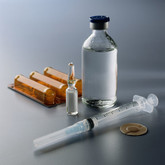Biosimilars/News
Bioton and Medipolis sign insulin analogue technology licensing agreement
Polish biotechnology company Bioton and Finnish-based contract research organisation (CRO) Medipolis GMP (Medipolis) have signed a licensing agreement on the manufacturing technology of an insulin analogue.
Roche does not see a threat from biosimilars until 2015
Switzerland-based drugmaker F. Hoffmann-La Roche (Roche) expects results from 19 late-stage clinical trials over the next 18 months to provide a stream of products to offset potential near-term threats to its cancer drugs Herceptin (trastuzumab) and Rituxan (rituximab).
Sun recalls biosimilar brain treatment
India-based Sun Pharmaceutical Industries (Sun Pharma) is once again in the news, but for the wrong reasons.
EMA reviews its first biosimilar monoclonal antibody
According to EMA’s list of applications for new human medicines under evaluation by the Committee for Medicinal Products for Human Use released in April 2012 the agency will be reviewing a new application for a biosimilar version of infliximab.
Teva receives FDA approval for filgrastim in the US
Teva Pharmaceutical Industries (Teva) announced on 30 August 2012 that FDA had granted approval for tbo-filgrastim (XM02 filgrastim), the first new granulocyte colony-stimulating factor (G-CSF) to be approved in the US in more than 10 years.
Dr Reddy’s plans EU launch for biosimilar rituximab
India-based generics drugmaker Dr Reddy’s Laboratories (Dr Reddy’s) is planning to launch its biosimilar monoclonal antibody Reditux (rituximab) in Europe.
Asian companies venture into biosimilars for kidney failure
Malaysia-based Chemical Company of Malaysia Berhad (CCM) wholly-owned subsidiary CCM Duopharma Biotech Berhad and Korea-based biotechnology company PanGen Biotech announced on 19 June 2012 that the companies had entered into an agreement to carry out a clinical trial of biosimilar erythropoietin in Malaysia to treat end stage renal failure patients.
iBio and GE Healthcare form new global alliance
Biotechnology company iBio, self-professed leader in the plant-made pharmaceutical field, and GE Healthcare, the health business of General Electric, announced on 26 July 2012 a new global alliance to commercialise plant-based technologies for the manufacture of biologicals and vaccines.
Deal struck over development of Herceptin biosimilar
Netherlands-based biopharmaceutical company Synthon announced on 18 July 2012 that it has entered into a global licensing agreement with Amgen and Watson Pharmaceuticals for the clinical development and testing of biosimilar trastuzumab as an alternative to Roche’s blockbuster anticancer agent Herceptin. The deal follows the results of a phase I trial reported on 22 March 2012 showing bioequivalence between Synthon’s trastuzumab and Herceptin [1].
Biosimilar monoclonal antibody approved in Korea
South Korean biotechnology company Celltrion announced on 23 July 2012 that the Korean Food and Drug Administration (KFDA) had approved its first monoclonal antibody, Remsima.













